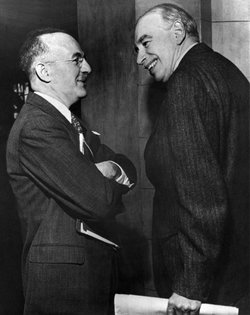Harry Dexter White
|
|
Harry Dexter White (October 1892–August 16, 1948) was an American economist. He was one of the founding fathers of the International Monetary Fund and the World Bank.
The son of Lithuanian immigrants, White was born in Boston, Massachusetts. As a young man, he served in the U.S. Army, fighting in France during World War I. After leaving the military, he began his education at Columbia University, then transferred to Stanford where he earned a degree in economics. He received a doctorate degree in economics from Harvard University at age 30.
White took up a teaching post at Lawrence University in Appleton, Wisconsin. In 1934, Jacob Viner, a professor at the University of Chicago working at the Treasury Department, wrote to White offering him a job there. White accepted, and in the latter half of the thirties met with John Maynard Keynes and other leading economists. When the United States entered World War II, White was put in charge of international matters for the Treasury. He had extensive dealings with America's allies, including the Soviet Union.
Philosophically, White was a Keynesian New Dealer. As a dedicated Rooseveltian internationalist his energies were directed at continuing the Grand Alliance and maintaining peace through a liberal trade regime. He believed that powerful multilateral institutions could avoid the mistakes of Versailles and prevent another worldwide depression.
In December 1941, after the attack on Pearl Harbor, White was appointed assistant to Henry Morgenthau, the Treasury secretary, to act as liaison between the Treasury and the State Department on all matters having a bearing on foreign relations and "responsibility for the management and operation of the Exchange Stabilization Fund without a change in its procedures."
After the war, White was closely involved with setting up what were called the Bretton Woods institutions - the International Monetary Fund and the World Bank. These institutions were intended to prevent some of the economic problems that occurred after the First World War, and help ensure that capitalism became the dominant post-war economic system.
Elizabeth Bentley told the FBI that White had been involved in espionage activities on behalf of the Russia during World War II. Whittaker Chambers later testified of his association with White in the Communist underground secret apparatus up to 1938. Bentley said White's colleagues passed information to her from him. Chambers claimed he recieved documents from White. Though recovering from a series of heart attacks, White stoutly proclaimed his lifelong commitment to the principles of democracy and the ideals of Roosevelt's New Deal. He died of a heart attack three days later and HUAC dropped the case.
Two years after his death in a memorandum dated 15 October 1950, White was positively identified by the FBI through evidence gathered by the Venona project as a Soviet agent code named "Jurist". [1] (http://wikisource.org/wiki/FBI_Memorandum_identifying_Harry_Dexter_White_as_agent_Jurist)
In 1953, Senator Joseph McCarthy alleged that Truman had known White was a Soviet spy when he appointed him to the IMF. However, this has now been refuted by declassified documents through the Freedom of Information Act which attest President Truman and the White House had not known of the existance of the Venona project. Long after his death, the Justice Department publicly disclosed the existence of conclusive evidence confirming White had indeed been involved in espionage activities.
External links
- Biography of White by the IMF (http://www.imf.org/external/pubs/ft/fandd/1998/09/boughton.htm)
- FBI Memorandum identifying Harry Dexter White as agent Jurist (http://wikisource.org/wiki/FBI_Memorandum_identifying_Harry_Dexter_White_as_agent_Jurist)
- FBI Venona file pg.17 (http://foia.fbi.gov/venona/venona.pdf)
- FBI Silvermaster file, p.27 (http://foia.fbi.gov/silversm/silversm2b.pdf)
- Time Magazine, The White Case Record, Nov. 30, 1953 (http://time-proxy.yaga.com/time/archive/preview/0,10987,823119,00.html)de:Harry Dexter White

